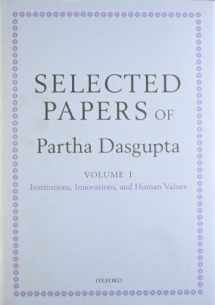
Selected Papers of Partha Dasgupta: Volume I: Institutions, Innovations, and Human Values and Volume II: Poverty, Population, and Natural Resources
ISBN-13:
9780199561513
ISBN-10:
0199561516
Edition:
1
Author:
Partha Dasgupta
Publication date:
2011
Publisher:
Oxford University Press
Format:
Hardcover
864 pages
FREE US shipping
Book details
ISBN-13:
9780199561513
ISBN-10:
0199561516
Edition:
1
Author:
Partha Dasgupta
Publication date:
2011
Publisher:
Oxford University Press
Format:
Hardcover
864 pages
Summary
Selected Papers of Partha Dasgupta: Volume I: Institutions, Innovations, and Human Values and Volume II: Poverty, Population, and Natural Resources (ISBN-13: 9780199561513 and ISBN-10: 0199561516), written by authors
Partha Dasgupta, was published by Oxford University Press in 2011.
With an overall rating of 4.5 stars, it's a notable title among other
books. You can easily purchase or rent Selected Papers of Partha Dasgupta: Volume I: Institutions, Innovations, and Human Values and Volume II: Poverty, Population, and Natural Resources (Hardcover) from BooksRun,
along with many other new and used
books
and textbooks.
And, if you're looking to sell your copy, our current buyback offer is $0.3.
Description
The Selected Papers of Partha Dasgupta brings together the works of one of the most distinguished economists working today. Professor Dasgupta was Knighted in 2002 for services to economics and his research interests have covered welfare and development economics, the economics of technological change, population, environmental and resource economics, the theory of games, and the economics of undernutrition. This two-volume collection represents a body of work spanning 40 years and contains a selection of Dasgupta's most original papers on six key themes. Both volumes feature foundational papers and substantial original introductions. The articles reflect inter-disciplinary scholarship in the author's search for a unifying way to analyse the problems people face in trying to allocate resources over time, among groups, and across uncertain contingencies. Each volume opens with an extended essay explaining the motivation underlying economics; the concept of what economics is about and how modern economists move within it. The author makes essential use of findings in anthropology, demography, ecology, geography, moral philosophy, and the environmental and nutritional sciences, but studies social phenomena through the lens of economics, to unravel the pathways by which scarce resources are produced, exchanged, and disseminated.


We would LOVE it if you could help us and other readers by reviewing the book
Book review

Congratulations! We have received your book review.
{user}
{createdAt}
by {truncated_author}


